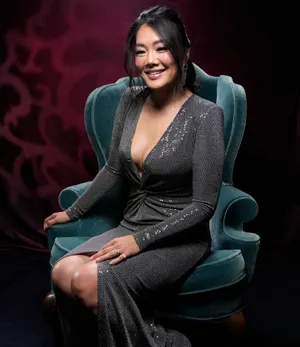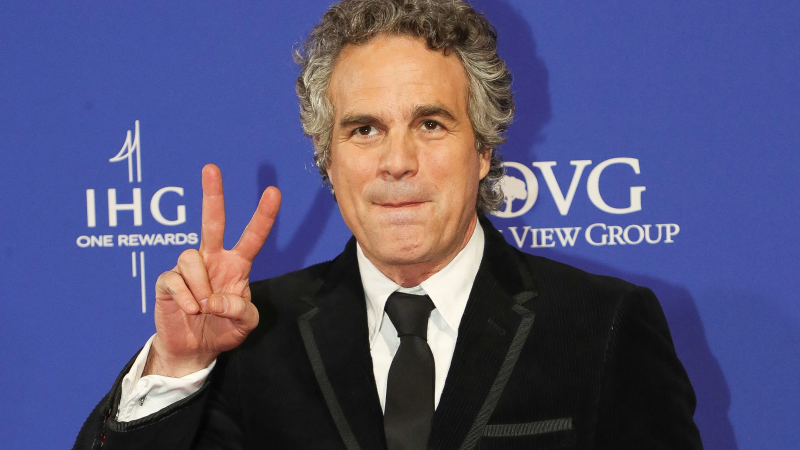Crystal Kung Minkoff talks 'up-and-down roller coaster' of her eating disorder
Drink-throwing, backstabbing and plenty of name-calling – "The Real Housewives of Beverly Hills" franchise has seen more than its fair share of drama. But one of the series' more "real" storylines in recent years brought a much-needed conversation to TV screens nationwide: cast member Crystal Kung Minkoff'sbulimia.
Kung Minkoff, 41, has opened up about her eating disorder on the franchise and faced skepticism and judgment from her cast mates. This National Eating Disorders Awareness Week, Kung Minkoff further details her experiences, her quest for understanding and when she'll tell her kids about it.
"It's an up-and-down roller coaster," the reality star says, nestled in the cozy library of her house. "I consider myself in recovery. But I'll be in recovery my whole life."

'I never thought I would talk about it'
When Kung Minkoff first joined the series, an awkward moment ensued between her and fellow new housewife Sutton Stracke. Stracke walked in on Kung Minkoff naked during a girls' trip, leaving her shaken.
"When I first started the show, I never thought I would ever talk about it," Kung Minkoff says. "And when the drama of Sutton and I, in terms of coming to my room, it was all shrouded within that because it's my body, it's my privacy, it was all of it. And I felt like I had to say it to let the women know why it was so intense for me." She knew she could hide it forever, but it would be hard to get to know her otherwise.
About 9% of people in the U.S. – nearly 29 million Americans – are estimated to have an eating disorder throughout their life, according to the National Association of Anorexia Nervosa and Associated Disorders. Kung Minkoff's began at age 11.
'Not a club you want to belong to'
The cast has since come to better understand Kung Minkoff. "I give grace that they will never really understand, and I will never understand what it's like to be in someone else's shoes," she says. "But to be a good person, you have to try. That's all I ask, is give me a little bit of grace to try to understand that I might be suffering or struggling."
That struggle might look different on a day-to-day basis. Just because she's not spiraling on the outside doesn't mean the thoughts aren't pressing against her forehead like an unending migraine. "It is at the forefront all day, every day," she says. "You can't talk about it with people because that's all you would talk about." She occasionally drops messages about it on her Instagram.
Her self-consciousness pitter-patters all through her mind, though. Are people looking at her on the street and thinking about it? On the flip-side, she's received many incredible messages from people sharing their stories.
"It's not a club you want to belong to, but we have each other," she says.
In case you missed:Katharine McPhee feared an eating disorder 'relapse' in pregnancy. She's not alone.
Crystal Kung Minkoff on talking to kids about her eating disorder
Kung Minkoff isn't sure when she'll tell her children about her eating disorder. Zoe is 9 and Max is 11 – yes, the same age she was when her issues began. They don't watch the show, but she knows one day they will; she's particularly concerned about her daughter growing up in the age of social media.
That said: "The way we talk to them about food and body, we're already planting the seeds to when I'm going to have to talk about it because I want them to really feel good in their body, feel healthy. Those are the kinds of conversations I didn't have as a child." Still, she's not ready to discuss it yet.
'We're all overcompensating':Why so many LGBTQ community members struggle with body dysmorphia

'It's different for every single person'
For those who know someone in their lives with an eating disorder, Kung Minkoff offers a recommendation: "If you know someone is suffering, don't try to diagnose, don't try and help them explain what it is because it's different for every single person," she says.
And that goes for those who perhaps don't meet the exact criteria for diagnosis. "If you're suffering in any way, you don't have to (fit) neatly into an eating disorder diagnosis or you don't have to fit neatly in body dysmorphic disorder to get support for your mental health or for your physical health," Samantha DeCaro, director of clinical outreach and education at The Renfrew Center, previously told USA TODAY.
Kung Minkoff remains grateful she received – and continues to receive – so much support: "I think about where I am today, and I feel so lucky."
If you or someone you know is struggling with body image or eating concerns, you can call The National Alliance for Eating Disorders' clinician-run helpline from 9 a.m. until 7 p.m. EST at (866) 662-1235. If you are in crisis or need immediate help, please text “ALLIANCE” to 741741 for free, 24/7 support.
Disclaimer: The copyright of this article belongs to the original author. Reposting this article is solely for the purpose of information dissemination and does not constitute any investment advice. If there is any infringement, please contact us immediately. We will make corrections or deletions as necessary. Thank you.






